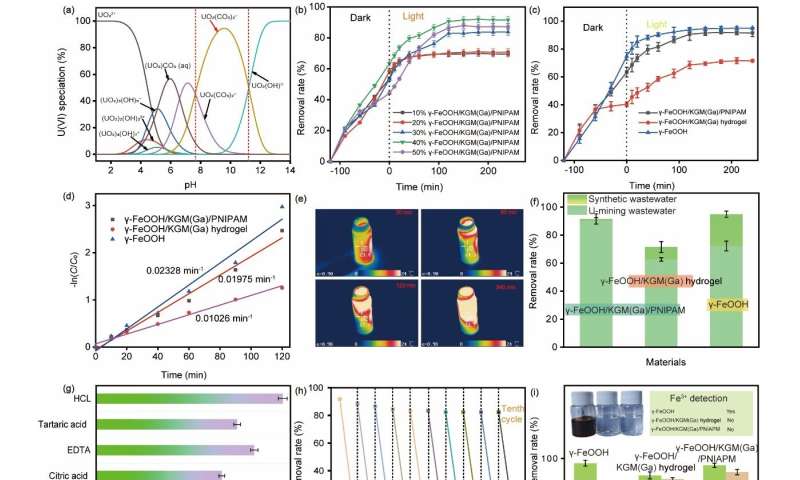To achieve carbon reduction goals, reducing emissions is crucial, and nuclear power plays a key role in providing reliable, low-carbon electricity, aiding carbon neutrality. However, the nuclear industry faces the significant challenge of managing uranium-containing wastewater, a byproduct of fuel production, nuclear plant operations, and facility decommissioning.
Due to the strong coordination properties of uranyl ions (UO22+) with carbonate ligands, carbonate-containing complexes easily form in wastewater, complicating uranium enrichment and removal. Therefore, new uranium extraction technologies are needed to replace traditional adsorption and membrane separation techniques for removing and recovering uranium from carbonate-containing uranium wastewater.
Photo-assisted uranium extraction is an emerging technology that uses photo-generated electrons to drive accelerated extraction kinetics and selectively extract uranium from carbonate-containing uranium wastewater, avoiding non-reductive coexisting ions. Traditional photocatalysis mainly relies on powdered nano-photocatalysts, which are difficult to separate from the reaction medium, limiting practical application.
To address this issue, a research team led by Wenkun Zhu and Tao Chen has investigated hydrogels as photocatalytic carriers, combining a novel strategy with intelligent thermosensitive materials that dynamically change their physical state at different temperatures. This approach resolves the contradiction between high contact area during the reaction and easy recovery afterward.
-

The performance of γ-FeOOH/KGM(Ga)/PNIPAM thermosensitive hydrogel was tested in carbonate-containing wastewater and real uranium mine wastewater. The results showed that γ-FeOOH/KGM(Ga)/PNIPAM thermosensitive hydrogel exhibited excellent uranium removal capability in both carbonate-containing wastewater and real uranium mine wastewater. Credit: Wenkun Zhu and Tao Chen
-

The adsorption-reduction-nucleation-crystallization mechanism of uranium on γ-FeOOH/KGM(Ga)/PNIPAM thermosensitive hydrogel was revealed by electron spin resonance, free radical capture, X-ray photoelectron spectroscopy, and so on. Credit: Wenkun Zhu and Tao Chen
The team’s study is published in the journal Science Bulletin.
The researchers demonstrated that the introduction of the thermosensitive material PNIPAM enables the dynamic phase transition of γ-FeOOH/KGM(Ga) microgels from a dispersed state with high specific surface area at low temperatures to a stable aggregated state at high temperatures. The γ-FeOOH/KGM(Ga)/PNIPAM thermosensitive hydrogel exhibited an excellent ability to remove up to 92.3% of uranium from carbonate-containing wastewater. Even in uranium mine wastewater, it maintained over 90% uranium removal efficiency.
Using electron spin resonance (ESR) and radical trapping experiments, the researchers confirmed that the γ-FeOOH/KGM(Ga)/PNIPAM thermosensitive hydrogel captures dissociated uranyl ions through oxygen-rich functional groups and subsequently reduces and immobilizes uranium via reactive species such as e– and ∙O2–.
This study provides a promising solution for developing high-performance intelligent photocatalytic hydrogels for treating uranium-containing wastewater.
More information:
Xudong Wu et al, Sol-gel transition effect based on konjac glucomannan thermosensitive hydrogel for photo-assisted uranium extraction, Science Bulletin (2024). DOI: 10.1016/j.scib.2024.07.005
Provided by
Science China Press
Citation:
Sol-gel transition effect based on thermosensitive hydrogel shows promised for photo-assisted uranium extraction (2024, August 27)
retrieved 27 August 2024
from https://phys.org/news/2024-08-sol-gel-transition-effect-based.html
This document is subject to copyright. Apart from any fair dealing for the purpose of private study or research, no
part may be reproduced without the written permission. The content is provided for information purposes only.


